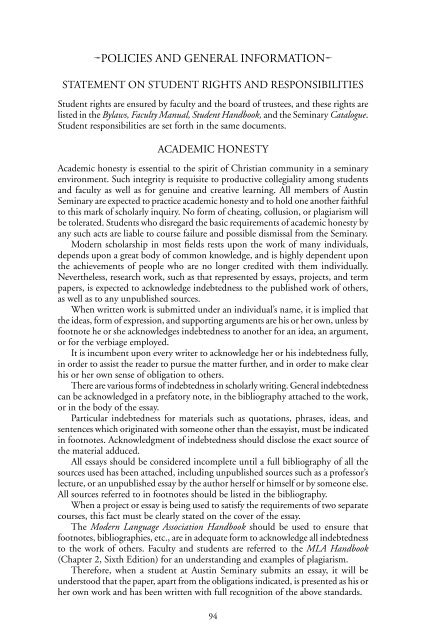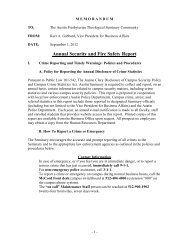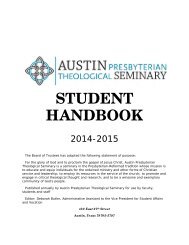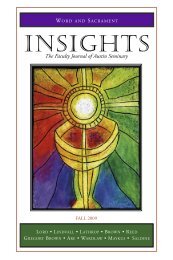Catalogue 2008 Book - Austin Presbyterian Theological Seminary
Catalogue 2008 Book - Austin Presbyterian Theological Seminary
Catalogue 2008 Book - Austin Presbyterian Theological Seminary
Create successful ePaper yourself
Turn your PDF publications into a flip-book with our unique Google optimized e-Paper software.
�POLICIES AND GENERAL INFORMATION�<br />
STATEMENT ON STUDENT RIGHTS AND RESPONSIBILITIES<br />
Student rights are ensured by faculty and the board of trustees, and these rights are<br />
listed in the Bylaws, Faculty Manual, Student Handbook, and the <strong>Seminary</strong> <strong>Catalogue</strong>.<br />
Student responsibilities are set forth in the same documents.<br />
ACADEMIC HONESTY<br />
Academic honesty is essential to the spirit of Christian community in a seminary<br />
environment. Such integrity is requisite to productive collegiality among students<br />
and faculty as well as for genuine and creative learning. All members of <strong>Austin</strong><br />
<strong>Seminary</strong> are expected to practice academic honesty and to hold one another faithful<br />
to this mark of scholarly inquiry. No form of cheating, collusion, or plagiarism will<br />
be tolerated. Students who disregard the basic requirements of academic honesty by<br />
any such acts are liable to course failure and possible dismissal from the <strong>Seminary</strong>.<br />
Modern scholarship in most fi elds rests upon the work of many individuals,<br />
depends upon a great body of common knowledge, and is highly dependent upon<br />
the achievements of people who are no longer credited with them individually.<br />
Nevertheless, research work, such as that represented by essays, projects, and term<br />
papers, is expected to acknowledge indebtedness to the published work of others,<br />
as well as to any unpublished sources.<br />
When written work is submitted under an individual’s name, it is implied that<br />
the ideas, form of expression, and supporting arguments are his or her own, unless by<br />
footnote he or she acknowledges indebtedness to another for an idea, an argument,<br />
or for the verbiage employed.<br />
It is incumbent upon every writer to acknowledge her or his indebtedness fully,<br />
in order to assist the reader to pursue the matter further, and in order to make clear<br />
his or her own sense of obligation to others.<br />
There are various forms of indebtedness in scholarly writing. General indebtedness<br />
can be acknowledged in a prefatory note, in the bibliography attached to the work,<br />
or in the body of the essay.<br />
Particular indebtedness for materials such as quotations, phrases, ideas, and<br />
sentences which originated with someone other than the essayist, must be indicated<br />
in footnotes. Acknowledgment of indebtedness should disclose the exact source of<br />
the material adduced.<br />
All essays should be considered incomplete until a full bibliography of all the<br />
sources used has been attached, including unpublished sources such as a professor’s<br />
lecture, or an unpublished essay by the author herself or himself or by someone else.<br />
All sources referred to in footnotes should be listed in the bibliography.<br />
When a project or essay is being used to satisfy the requirements of two separate<br />
courses, this fact must be clearly stated on the cover of the essay.<br />
The Modern Language Association Handbook should be used to ensure that<br />
footnotes, bibliographies, etc., are in adequate form to acknowledge all indebtedness<br />
to the work of others. Faculty and students are referred to the MLA Handbook<br />
(Chapter 2, Sixth Edition) for an understanding and examples of plagiarism.<br />
Therefore, when a student at <strong>Austin</strong> <strong>Seminary</strong> submits an essay, it will be<br />
understood that the paper, apart from the obligations indicated, is presented as his or<br />
her own work and has been written with full recognition of the above standards.<br />
94










